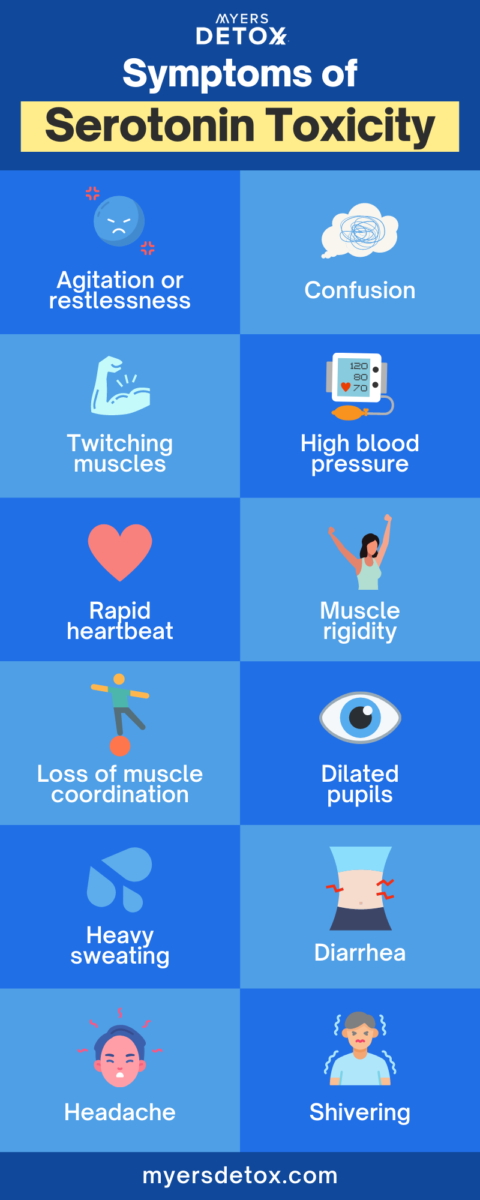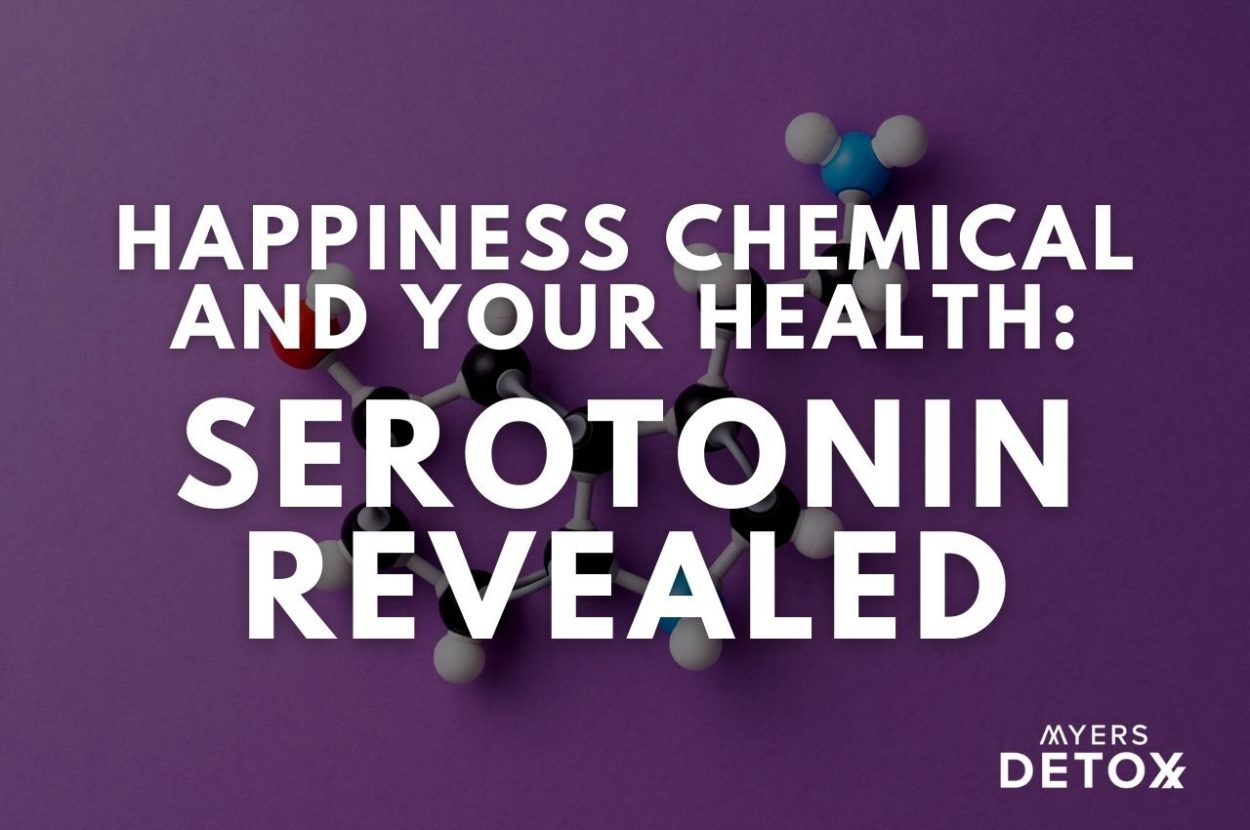Let’s talk about serotonin.
With the current state of the world, it should come as no surprise that anxiety and depression are on the rise. In fact, according to the Anxiety and Depression Association of America, anxiety disorders are the most common mental illness in the U.S, affecting 18% of the population each year. That’s 40 million people.
And Major Depression Disorder isn’t far behind it, affecting 16.1 million adults in America, or 6.7% of the population.
Perhaps even more disturbing is that anxiety disorders impact around 25% of children aged 13 to 18 years old[1].
With so much tension and unrest, people are looking to natural and medical solutions for these emotional imbalances. Which begs the question; is managing your mood with drugs effective? Moreover, is it safe?
Many of the drugs aimed at improving mood increase levels of the neurotransmitter serotonin. One often under-reported side effect of taking serotonin-enhancing drugs is something called serotonin toxicity.
In this article, you’ll learn:
- What serotonin does in your body
- How people become serotonin toxic
- Some surprising sources of serotonin
- Risk factors for serotonin toxicity
- What to do if you serotonin toxicity effects you or a loved one
Serotonin: What It Is And How It Works
Serotonin is a neurotransmitter that regulates numerous physiological processes. Although it is best known for its role in mood regulation, it plays several other physiological roles as well.
These include[2]:
- Cardiovascular function
- Bowel motility
- Ejaculation
- Bladder control
- Blood clotting
- Pulmonary function
Most notable, however, is the role that serotonin plays in your central nervous system (CNS). In fact, serotonin and its receptors play a role in almost all brain functions, especially impacting behavior. Some examples include[2]:
- Mood regulation
- Perception
- Memory
- Anger
- Aggression
- Fear
- Appetite
- Addiction
- Stress responses
- Sexuality
Other effects that serotonin has on your CNS activity include[2]:
- Motor control
- Sleep and circadian rhythms
- CNS vascular tone
- Body temperature
- Respiration
What Is Serotonin Toxicity?
Serotonin toxicity occurs when too much serotonin floods your body, resulting in a host of symptoms related to the overstimulation of serotonin receptors.
The most common cause of serotonin toxicity is the mismanagement of drugs meant to increase your serotonin levels. There are several classes of drugs (medications, nutraceutical, herbal, and illegal) that can impact the way your body produces and manages serotonin.
When these drugs are taken in excess or used in combination, it can result in a sharp increase in serotonin that floods your body and throws your system out of balance[3].
Drugs That May Cause Serotonin Toxicity
A wide range of drugs could cause serotonin toxicity, falling into the categories of prescription, over-the-counter, or illegal drugs.
Some of the most common include[4][5]:
Selective serotonin reuptake inhibitors (SSRIs):
- Celexa
- Prozac
- Paxil
- Zoloft
MAOIs (Monoamine oxidase inhibitors) antidepressants:
- Marplan
- Nardil
Serotonin and norepinephrine reuptake inhibitors (SNRIs), antidepressants:
- Cymbalta
- Effexor XR
Pain medications:
- Codeine
- Fentanyl
- Hydrocodone
- Oxycodone (Oxycontin, Roxicodone)
Herbal supplements:
- St. John’s wort
- Ginseng
- Nutmeg
Illegal drugs:
- MDMA (ecstasy)
- LSD
- Cocaine
- Amphetamines
The Physiology Behind Serotonin Toxicity
Serotonin toxicity occurs when you have too much serotonin flooding your system, resulting in an overactivation of your serotonin receptors.
Your body has both central and peripheral serotonin receptors. Peripheral serotonin is produced primarily in your gut. Here, it functions to stimulate blood vessel contraction, uterine contraction, bronchoconstriction (narrowing of your airways), and the movement of your GI (gastrointestinal tract).
Central serotonin is produced in your brain. Here it functions to modulate wakefulness, attention, appetite, behavior, and mood (depression and anxiety). It also inhibits excitatory neurotransmission (calms the stimulation of certain neurotransmitters)[4].
The mechanisms behind serotonin toxicity depend on the type of drug that you are taking. The most common causes of increases in serotonin include:
- Inhibition of serotonin uptake (selective serotonin reuptake inhibitors, or SSRIs)
- Decreased serotonin metabolism (it’s not properly broken down)
- Increased serotonin synthesis
- Increased serotonin release
- Overactivation of serotonin receptors
Risk Factors And Symptoms Of Serotonin Toxicity
Risk Factors
Some people are at a higher risk of serotonin toxicity. You may be at risk if[5]:
- You recently started taking a higher dose of medication that increases serotonin levels
- You take more than one drug that impacts serotonin levels
- You take any combination of drugs or herbal supplements that can impact serotonin
- You use illicit drugs like LSD, MDMA, or cocaine
Symptoms Of Serotonin Toxicity

Due to the wide-reaching role that serotonin plays in your body, the symptoms of toxicity can impact multiple systems. Some of the most common symptoms of serotonin toxicity include[5]:
- Agitation or restlessness
- Confusion
- High blood pressure
- Rapid heartbeat
- Twitching muscles
- Muscle rigidity
- Loss of muscle coordination
- Dilated pupils
- Heavy sweating
- Diarrhea
- Headache
- Shivering
In more severe cases, symptoms may even include high fever, loss of consciousness, seizures, or irregular heartbeat.
How To Manage Serotonin Toxicity
If you feel you have serotonin toxicity, the first thing you should do is contact your healthcare provider. They will then be able to give you an examination and take the necessary bloodwork to assess what’s going on.
Serum serotonin levels may not correlate with serotonin toxicity, so your doctor will have to evaluate you to assess symptoms and other makers of imbalance.
From there, they may discontinue one or more of the serotonergic drugs that you are taking. They may also administer serotonin antagonists to block the receptors. Furthermore, they will be able to target your specific symptoms and offer supportive care to normalize your vital signs.
Management of serotonin toxicity really comes down to the individual and how severe the toxicity is[6].
Support Your Liver
One way that you can help yourself, in addition to working with your health care practitioner, is to support your liver.
Supporting your liver will help your body clear itself of excess serotonin. There are many ways to support your liver, but adding nutrients that promote liver detox is one of the most effective ways. Taking a supplement like Daily Detox can support the pathways that are necessary to clear your body of serotonin when it’s in excess.
Daily Detox is tailor-made with a combination of herb and food ingredients that are research-backed to support liver function. Regardless of what you’re taking (meds, herbs, or illegal drugs), your liver is responsible for processing them and removing them from your body. Therefore, supporting your liver is an absolute must if you want to help your body clear toxic levels of serotonin.
Takeaway
With the upward trend that we are experiencing in anxiety and depression, it comes as no surprise that many people are turning to antidepressants and anti-anxiety drugs for a little boost.
While these medications may be helpful in the short-term, they come with their own risks as well.
If you have been taking any drug (medical, herbal, or illegal) that impacts serotonin activity, it’s vital that you become aware of the potentially toxic effect of high serotonin. Serotonin toxicity often goes undiagnosed, so it’s up to you to listen to your body and make sure that your delicate system isn’t thrown off balance.










